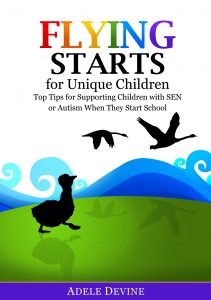
Adele Devine reflects upon her new book Flying Starts for Unique Children and offers practical advice on making sure that children with Autism and SEN get off to the best start at school.
Imagine that you are about to start a new job, but you know nothing about it. You do not know where it will be, who you will be working with, what the expectations will be or how long the day will last. How would this make you feel – nervous, resistant or even fearful?
Starting school
When children start school they enter the great unknown. There are those who will transition without issue. These children slot in, they see toys, play, interact, make friends and meet expected milestones.
Then there is the child who arrives filled with fear. They find the sounds painful, the smells intolerable, the environment overwhelming and the other children exhaustingly unpredictable. Maybe this child has autism. Maybe this child has an undiagnosed, invisible disability
There are simple accommodations that can make the world of difference to the first impressions of a child with Special Educational Needs. These things should be in place in every pre school and reception class before the children start school. First impressions are important. There are no second chances. If we do not get it right from the start the child will remember. They may decide that they do not like school. They may resist, they may refuse or worse still they may start to withdraw.
A good start
We start school once in our lives. It is vital that schools are prepared to accommodate and include EVERY child. The right strategies must be in place from the start. There are simple things you can do to ensure that children with SEN have a positive experience of your setting:
- Gather information about likes, dislikes, fears and comforters.
- Suggest children bring in a favourite (non breakable) toy from home.
- Offer an initial taster visit when there are no other children around.
- Stagger start times so sensitive children can avoid the masses.
- Avoid shutting parents off at the door. Suggest they stay while the child settles.
- Create quieter areas and access to outside space away from the throng.
- Kneel down to the child’s level when speaking – it’s less intimidating.
- Use stickers and rewards. Be overly positive and enthusiastic.
- Use MakatonTM signs, visuals, simple language and a consistently calm voice.
- Build the child’s trust and show empathy for things they might find tricky.
What makes an inclusive setting?
- Visuals showing where the ‘toilets’ are and symbols or photos so that child can ask to go.
- Photos showing the contents of boxes and cupboards and symbols or photos to make requests.
- Visual schedules set up for individual children.
- An area for sensory integration or for ‘time out’ to let off bounce.
- Photos by pegs, on schedules and individual schedules so that non- readers can achieve independence.
- A snack folder with symbols or photos so pre-verbal children can make choices.
- A lack of clutter (both visual and verbal).
- Clearly defined areas for play, for work, for choice, for snack and for active play.
- Sand timers and visual volume controls within easy reach.
- A loving, supportive atmosphere. A clear focus on the ‘can do’s’.
Supporting parents
Children are by nature instinctive, they will pick up on and mirror how their parents feel. It is vital that parents feel secure and happy that a setting is the best place because if they do not their child will know. Parents must feel that communication lines are open, whether it be email, phone or face to face. They must feel that the teacher is there to support, guide, respect and listen to them empowering them to help their child.
Adele Devine is a Special Needs teacher at a school for young people with severe learning difficulties and autism. All her Tips are taken from her new book Flying Starts for Unique Children: Top Tips for Supporting Children with SEN or Autism When They Start School. It is available for £16.99 and can be purchased from JKP.com.